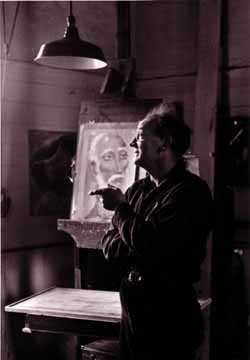
CHARLES WARD
(1900 – 1962)
Charles William Ward was born in Trenton, New Jersey, on January 24, 1900, the son of a machinist. Ward began taking courses in the evening at the School of Industrial Arts in 1916 while working in factory. From 1924 until 1926, he was at the school on a full-time basis. From 1926 through 1931 Ward was a student at the Pennsylvania Academy of Fine Arts. There he won the Thompson Prize for Composition; the Lea Award for Draughtsmanship; and, in 1930, the Cresson European Traveling Scholarship, which enabled him to go abroad and study in Great Britain, Belgium, France, Spain, Italy and Switzerland.
In 1932 he moved to Carversville, Pennsylvania, where he maintained a studio there for thirty years until his death. He drew his inspiration from the surrounding scene there, and from painting trips to Mexico, the first in 1939, and the second, with his family, in 1954.
In 1935, he made history when he executed the first Post Office mural under the Public Works of Art Project, "Progress of Industry" for the Trenton Post Office. In 1937 he completed two others for the same building, entitled "Rural Delivery", and "The Second Battle of Trenton". In 1938 his mural "Cotton Picking" was installed in the Roanoke Rapids Post Office in North Carolina. Despite controversy that the work was too respectful of African Americans, the mural remained. Although he had studies for other WPA murals, he turned from the public to the personal in his work.
Ward’s easy versatility in oils, watercolors, drawing and printmaking, have drawn comparisons to Goya, Daumier, Rivera, Reginald Marsh, and Daniel Garber, but each work bears his personal stamp of integrity. His work is in a number of public collections including the Smithsonian Museum of American Art, the James A. Michener Art Museum, the Philadelphia Museum of Art, and the New Jersey State Museum.
In 1958 one writer summed up the feeling for Ward’s work. "In a time when success is often measured in terms of material goods and incomprehensibility sometimes seems an end in itself, the simple life and the clear, straightforward statements of artist Charlie Ward seem out of place. For here is work that touches at the very heart of life, dealing with the simple things, the ordinary, the everyday, bringing to them an understanding rare in a day when neuroses are the norm and shock value is more important than good painting."
Charles Ward died of a heart attack in Philadelphia, Pennsylvania, on December 7, 1962 after picking up a work from an exhibition.

© 2004 The Ben Solowey Collection. All Rights Reserved.


